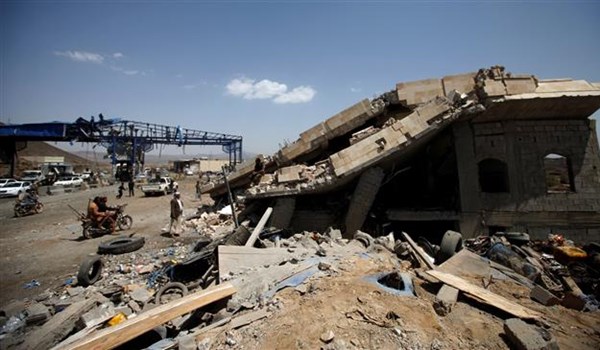'War Crime': Saudi-Led Coalition Hits Health Facilities in Yemen's Hudaydah

The Health Ministry announced in a statement that it is a war crime and
disregard all international laws that prohibit and criminalize targeting health
facilities and ambulance units.
The statement added that the international community and the United Nations are
watching and crying days and nights for humanitarian situation in Hodaydah,
while they are deaf to the crimes commited by the coalition forces.
The statement stressed that the international bodies' mum on the crimes against
the Yemeni people and infrastructure encouraged invaders to continue without
fear of any penalty.
The Ministry of Health pointed out that Riyadh and its allies have targeted more
than 400 health facility, including hospitals, oxygen factories and more than 62
ambulances, since beggining of the war in Yemen in March 2015.
Saudi-led forces have started the Hudaydah operation since Wednesday, while the
UN has warned could cause up to 250,000 deaths.
The United Nations has expressed deep concern over the assault by the Saudi-led
coalition in Hudaydah as rights groups warned about the catastrophic
repercussions of the offensive, which is considered the largest battle of the
three-year war.
"I am extremely concerned about military escalation in Hodeida & their
humanitarian & political impact,” the UN special envoy to Yemen, Martin
Griffiths, said in a tweet after Saudi-led forces launched an offensive on the
key port.
UN Secretary-General Spokesperson Stephane Dujarric had also stressed that
"we’re extremely concerned about the situation around Hudaydah. Our colleagues
in the area have started to take precautionary measures in terms of ramping
up assistance and redefining contingency plans in case of this further
escalation".
Lise Grande, the UN Humanitarian Coordinator for Yemen, had also said
humanitarian agencies "fear, in a prolonged worst case, that as many as 250,000
people may lose everything - even their lives".
The UN warned that the likely "catastrophic humanitarian impact" would be
worsened due to Hudaydah's key role as the point of entry for some 70 percent of
Yemen's imports.
Saudi Arabia has been striking Yemen since March 2015 to restore power to
Mansour Hadi, a close ally of Riyadh. The Saudi-led aggression has so far killed
at least 16,000 Yemenis, including hundreds of women and children.
Despite Riyadh's claims that it is bombing the positions of the Ansarullah
fighters, Saudi bombers are flattening residential areas and civilian
infrastructures.
According to several reports, the Saudi-led air campaign against Yemen has
driven the impoverished country towards humanitarian disaster, as Saudi Arabia's
deadly campaign prevented the patients from travelling abroad for treatment and
blocked the entry of medicine into the war-torn country.
Yemen is the world’s largest humanitarian crisis with more than 22 million
people in need and is seeing a spike in needs, fuelled by ongoing conflict, a
collapsing economy and diminished social services and livelihoods.
The United Nations aid chief has recently expressed concern over the decline of
food imports to Yemen amid restrictions put in place by the Saudi Arabia,
warning that a further 10 million Yemenis could face starvation by year-end.
"I am particularly concerned about the recent decline of commercial food imports
through the Red Sea ports," Mark Lowcock, the UN emergency relief coordinator,
said in a statement.
Lowcock stated that commercial food and fuel imports remained "well short of
pre-blockade averages", warning that "if conditions do not improve, a further 10
million people will fall into this category by the end of the year".
Source:FNA
















